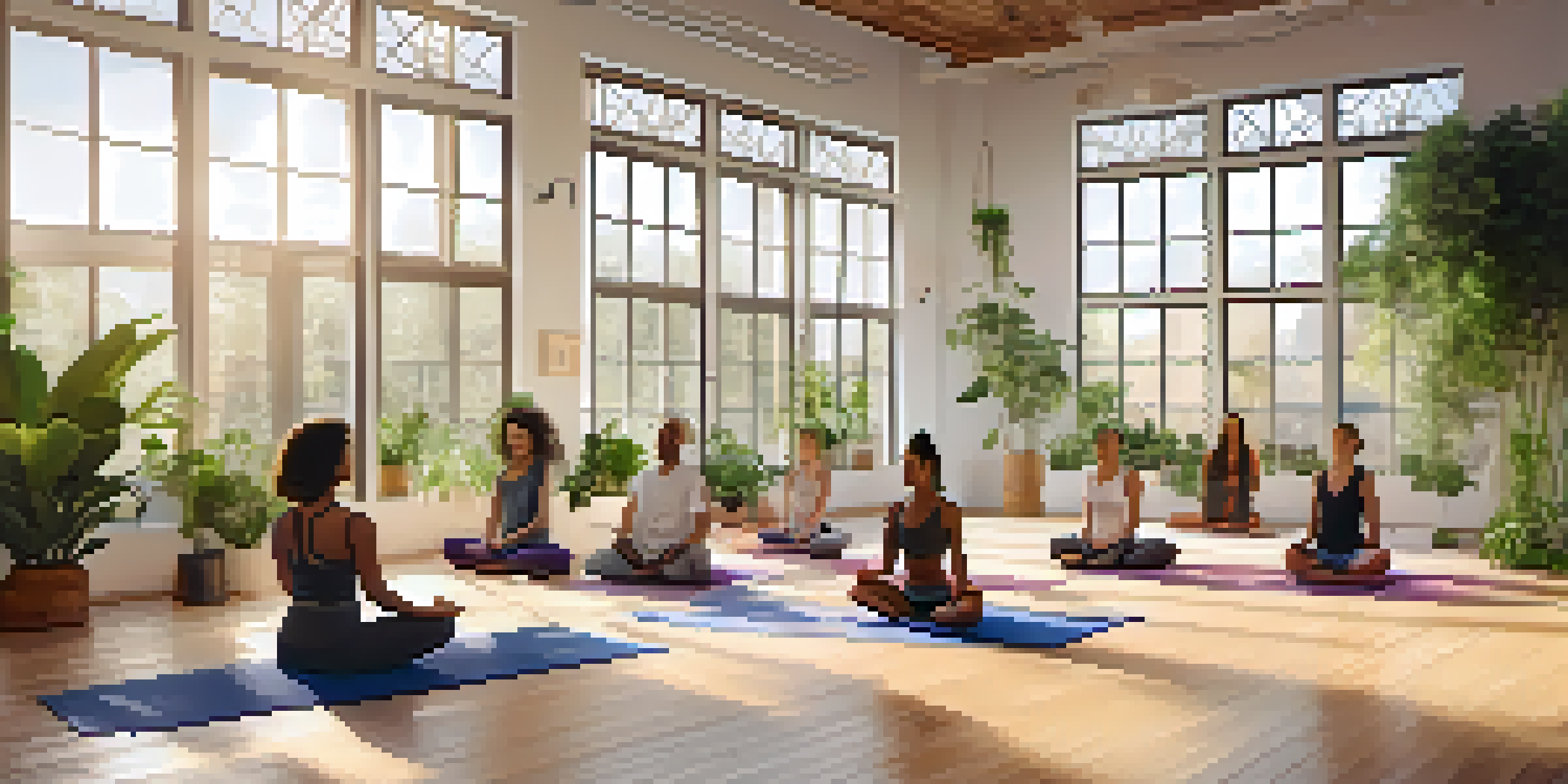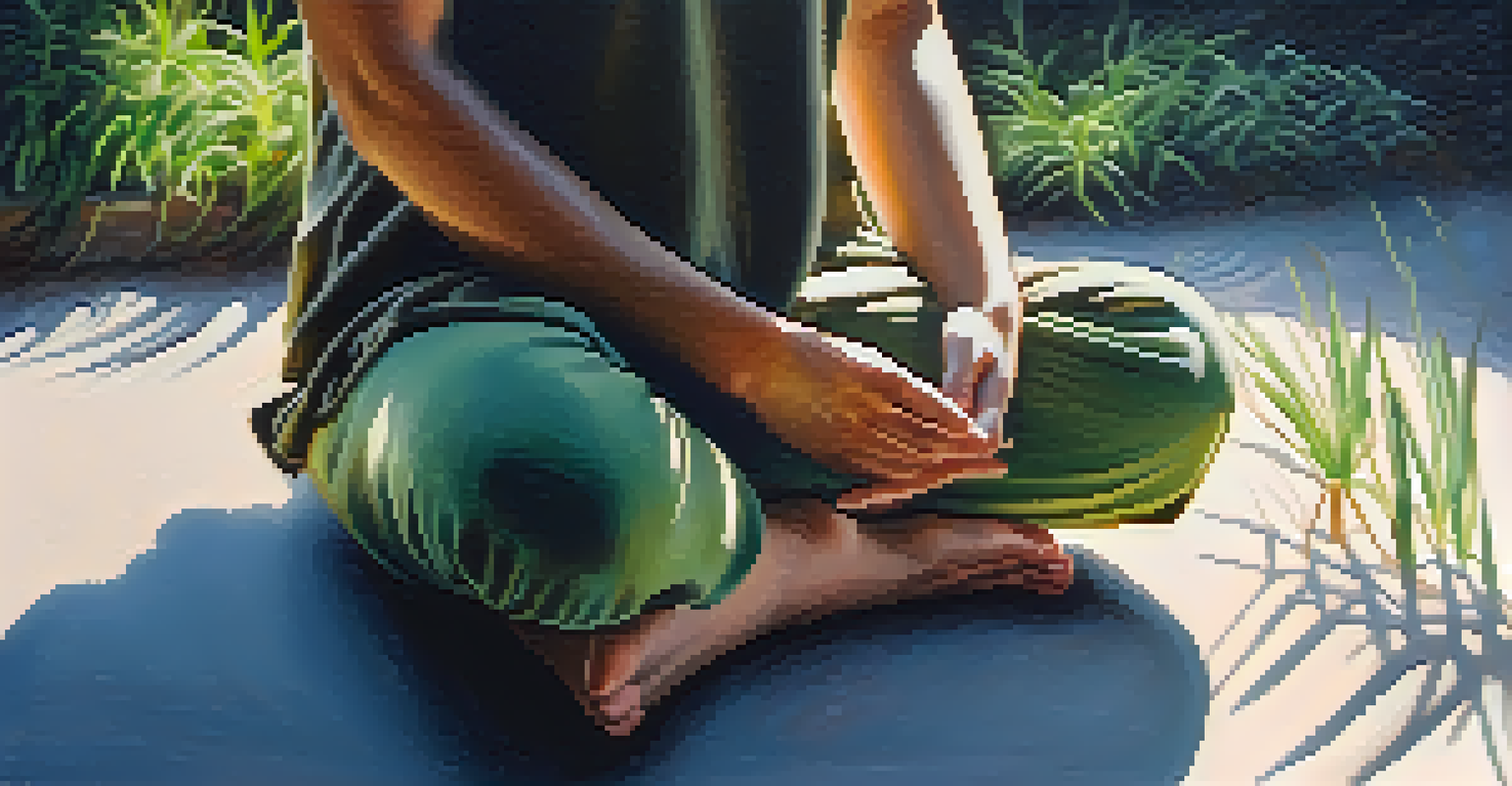How to Use Breathwork to Enhance Flexibility in Yoga

Understanding Breathwork: The Foundation for Flexibility
Breathwork refers to various techniques that control your breath to enhance physical and mental well-being. In yoga, breath control, or pranayama, plays a crucial role in deepening your practice. By focusing on your breath, you create a connection between your mind and body that can lead to greater flexibility.
The breath is the bridge which connects life to consciousness, which unites your body to your thoughts.
When you practice breathwork, you're not just inhaling and exhaling; you're actively engaging your body and mind. This engagement allows for a more profound awareness of your physical limits and capabilities. As you deepen your breath, you also send signals to your muscles to relax, which can help you stretch further without strain.
Think of your breath as a bridge between your mind and body. Just as a bridge connects two landmasses, breathwork connects your mental focus with your physical practice, enhancing your flexibility in yoga. The more you practice, the more natural this connection becomes, leading to improved results.
The Role of Breath in Yoga Poses and Flexibility
In yoga, each pose aligns with specific breathing techniques that can enhance your flexibility. For instance, in forward bends, deep inhalations can create space in your spine, while long exhalations help you sink deeper into the stretch. This coordinated effort allows you to maximize the benefits of each pose.

Moreover, paying attention to your breath helps you maintain focus and reduces the risk of injury. When you breathe deeply and steadily, your muscles become more pliable, making it easier to achieve deeper stretches. This is particularly important as you navigate more challenging poses that require a greater range of motion.
Breathwork Enhances Yoga Flexibility
Integrating breath control into your yoga practice deepens your connection between mind and body, leading to increased flexibility.
Imagine your breath as a guiding light in the sometimes murky waters of a yoga class. It illuminates the path forward, helping you navigate through complex poses while ensuring your body remains safe and supported. By tuning into your breath, you can enhance your flexibility and overall experience.
Techniques to Integrate Breathwork into Your Practice
To effectively integrate breathwork into your yoga practice, start with simple techniques like diaphragmatic breathing. This involves expanding your diaphragm rather than just your chest, allowing for fuller breaths that oxygenate your body. Incorporating this technique can significantly enhance your flexibility over time.
Breath is the vital link between your body and your mind.
Another effective method is to synchronize your breath with movement. For example, inhale as you lift your arms overhead and exhale as you fold forward. This rhythmic approach not only increases flexibility but also creates a meditative flow that keeps your mind engaged and present.
Consider your breath as a conductor leading an orchestra. Just as a conductor brings harmony to music, your breath can create a seamless flow in your movements. By practicing these techniques, you’ll find that your flexibility and overall yoga experience improve dramatically.
Mindfulness and Breathwork: A Path to Greater Flexibility
Mindfulness in breathwork allows you to become fully aware of your body and its limits. By focusing on your breath, you cultivate a sense of presence that helps you listen to your body’s needs. This awareness is essential for improving flexibility, as it encourages you to stretch only as far as your body comfortably allows.
Incorporating mindfulness into your practice can also reduce stress, which often manifests as tension in the muscles. When you breathe mindfully, you encourage relaxation, allowing your muscles to release and become more flexible. This dual benefit of mindfulness and breathwork can lead to significant improvements in your yoga practice.
Mindfulness Boosts Body Awareness
Practicing mindfulness in breathwork helps you listen to your body’s limits, fostering greater flexibility and reducing muscle tension.
Think of mindfulness as a gentle guide, nudging you towards greater self-awareness. By being present with your breath, you can explore your body’s capabilities without pushing it too hard. This approach not only fosters flexibility but also enhances your overall enjoyment of yoga.
Breath Patterns for Specific Yoga Poses
Different yoga poses can benefit from specific breath patterns. For example, in lunges, try inhaling deeply to expand your chest and exhaling to sink deeper into the stretch. These targeted breath patterns can help you maximize your flexibility in each pose while maintaining alignment.
In restorative poses like Child’s Pose, slow, rhythmic breathing allows your body to relax and release tension. This type of breathwork encourages deeper stretches and assists in gradually increasing flexibility. The more you practice these patterns, the more intuitive they will become.
Visualize your breath as a tool designed to enhance your practice. Just as a craftsman uses various tools to shape their work, you can use breath patterns to mold your flexibility within each pose. By understanding how to harness your breath effectively, you can unlock your full potential.
The Importance of Consistency in Breathwork Practice
Like any skill, enhancing flexibility through breathwork requires consistency and dedication. Regular practice allows your body to adapt and respond positively to the techniques you're using. Aim to integrate breathwork not just during yoga sessions, but also in your daily life for maximum benefits.
Setting aside a few minutes each day for focused breathwork can create significant changes in your flexibility over time. Even simple practices like deep breathing while sitting at your desk can help. The more you cultivate this habit, the more natural it will become during your yoga practice.
Consistency is Key to Improvement
Regular breathwork practice, both in yoga and daily life, cultivates flexibility over time, much like nurturing a garden.
Picture your journey with breathwork as a garden. With consistent care and attention, your flexibility will blossom over time. By making breathwork a regular part of your routine, you're giving yourself the gift of enhanced flexibility and a deeper connection to your practice.
Challenges and Solutions in Breathwork for Flexibility
While breathwork can greatly enhance flexibility, some practitioners may encounter challenges along the way. Common issues include difficulty maintaining focus or feeling awkward while trying to synchronize breath with movement. Recognizing these challenges is the first step toward overcoming them.
One solution is to start small, focusing on just a few poses and their corresponding breath patterns. Gradually, as you become more comfortable, you can expand your practice to include more complex poses. Remember, it's perfectly okay to take it slow and give yourself time to adjust.

Think of these challenges as stepping stones on your journey. Each one presents an opportunity for growth and learning. By approaching them with patience and a positive mindset, you can turn obstacles into valuable lessons that enhance your flexibility and overall yoga experience.